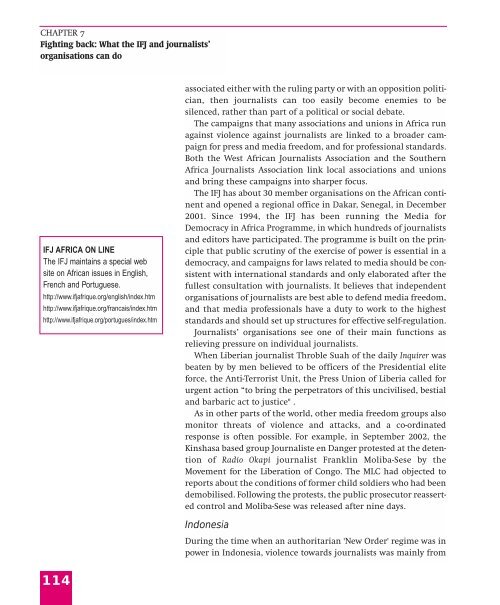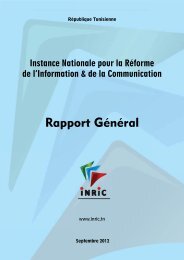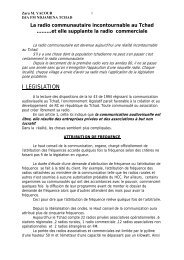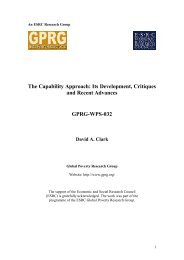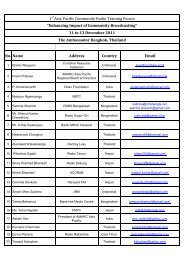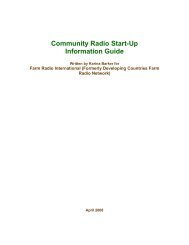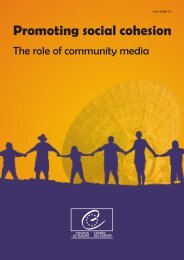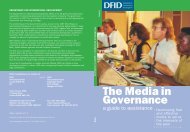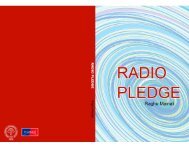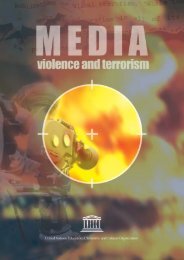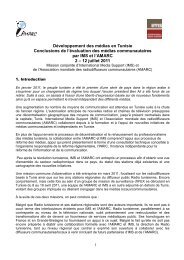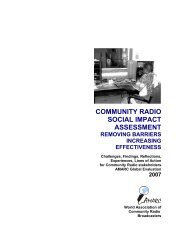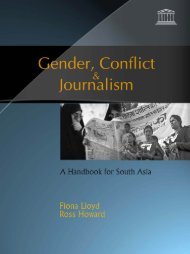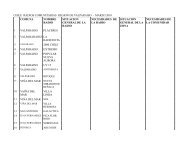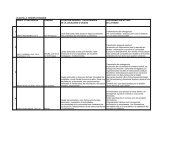Live News - A Survival Guide - International Federation of Journalists
Live News - A Survival Guide - International Federation of Journalists
Live News - A Survival Guide - International Federation of Journalists
- No tags were found...
Create successful ePaper yourself
Turn your PDF publications into a flip-book with our unique Google optimized e-Paper software.
CHAPTER 7Fighting back: What the IFJ and journalists’organisations can doIFJ AFRICA ON LINEThe IFJ maintains a special website on African issues in English,French and Portuguese.http://www.ifjafrique.org/english/index.htmhttp://www.ifjafrique.org/francais/index.htmhttp://www.ifjafrique.org/portugues/index.htmassociated either with the ruling party or with an opposition politician,then journalists can too easily become enemies to besilenced, rather than part <strong>of</strong> a political or social debate.The campaigns that many associations and unions in Africa runagainst violence against journalists are linked to a broader campaignfor press and media freedom, and for pr<strong>of</strong>essional standards.Both the West African <strong>Journalists</strong> Association and the SouthernAfrica <strong>Journalists</strong> Association link local associations and unionsand bring these campaigns into sharper focus.The IFJ has about 30 member organisations on the African continentand opened a regional <strong>of</strong>fice in Dakar, Senegal, in December2001. Since 1994, the IFJ has been running the Media forDemocracy in Africa Programme, in which hundreds <strong>of</strong> journalistsand editors have participated. The programme is built on the principlethat public scrutiny <strong>of</strong> the exercise <strong>of</strong> power is essential in ademocracy, and campaigns for laws related to media should be consistentwith international standards and only elaborated after thefullest consultation with journalists. It believes that independentorganisations <strong>of</strong> journalists are best able to defend media freedom,and that media pr<strong>of</strong>essionals have a duty to work to the higheststandards and should set up structures for effective self-regulation.<strong>Journalists</strong>’ organisations see one <strong>of</strong> their main functions asrelieving pressure on individual journalists.When Liberian journalist Throble Suah <strong>of</strong> the daily Inquirer wasbeaten by by men believed to be <strong>of</strong>ficers <strong>of</strong> the Presidential eliteforce, the Anti-Terrorist Unit, the Press Union <strong>of</strong> Liberia called forurgent action “to bring the perpetrators <strong>of</strong> this uncivilised, bestialand barbaric act to justice" .As in other parts <strong>of</strong> the world, other media freedom groups alsomonitor threats <strong>of</strong> violence and attacks, and a co-ordinatedresponse is <strong>of</strong>ten possible. For example, in September 2002, theKinshasa based group Journaliste en Danger protested at the detention<strong>of</strong> Radio Okapi journalist Franklin Moliba-Sese by theMovement for the Liberation <strong>of</strong> Congo. The MLC had objected toreports about the conditions <strong>of</strong> former child soldiers who had beendemobilised. Following the protests, the public prosecutor reassertedcontrol and Moliba-Sese was released after nine days.IndonesiaDuring the time when an authoritarian 'New Order' regime was inpower in Indonesia, violence towards journalists was mainly from114


